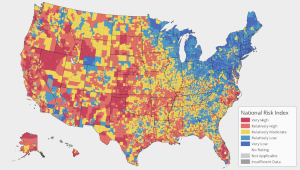3 Uses for ZIP Codes to Stay Informed
Posted on by
July 1 is U.S. ZIP Code Day.
The U.S. Postal Service (USPS)—then called the U.S. Post Office Department—introduced the Zone Improvement Plan (ZIP) code in 1963. USPS’ purpose was to facilitate the automatic sorting of mail and reduce the number of steps a piece of mail would go through to reach a recipient.(1)
Since then, USPS has created and deleted ZIP codes as needed. It expanded ZIP codes from 5 digits to 9 and then to 11.(1)
The meanings and utility of ZIP codes have changed too. Today, they have impact implications and uses beyond moving mail.
Your ZIP code can help you stay informed before and during emergencies, including disease outbreaks and natural disasters. Here are three examples of the kinds of information you can find using your ZIP code.
Your Hazards Risk
You can’t prepare for something if you don’t know it’s a threat. Part of staying informed is knowing about the hazards that can cause you harm and how to mitigate (or reduce) your risk. Your ZIP code can help you learn about hazards in your area.
The National Risk Index is an online mapping application from FEMA that is searchable by ZIP code. It was developed with local emergency planners in mind, but you too can use it to identify the hazards most likely to threaten your health and safety.
The Index uses data for natural hazards and community risk factors to develop a “baseline relative risk measurement” for each county and census area. It analyzes expected annual loss, social vulnerability, and community resilience to determine a community’s potential for negative impacts resulting from 18 natural hazards.(2) Hazards include earthquakes, heat waves, hurricanes, and wildfires.
Learn more about how the Index calculates risk.
The Nearest Vaccine Provider
As with other diseases, you are protected best from COVID-19 when you stay up to date with the recommended vaccine doses and boosters.(3)
Staying up to date means getting all doses in the primary series and all boosters recommended for you. CDC recommends COVID-19 vaccines for everyone ages 6 months and older, and COVID-19 boosters for everyone ages 5 years and older, when eligible.(3)
COVID-19 vaccines are available at no cost.(4) Use your ZIP code to find COVID-19 vaccines and boosters near you. You can also text your ZIP code to 438829 for location information.
You can also use your ZIP code to find the nearest Test to Treat sites. There are hundreds of locations nationwide where you can
- get tested or bring your test results,
- get a prescription from an on-site healthcare provider if you are at high risk of getting very sick, and
- fill your prescription for an oral COVID-19 treatment.(5)
Learn more about the Test to Treat initiative, including what to bring with you when you go.
Your Local Forecast
The right message at the right time from the right person can save lives in times of crisis. Having multiple ways to receive those messages, including emergency alerts, can help you stay healthy and safe during an emergency.
Some of the most important kinds of emergency alerts are hazardous weather advisories, watches, and warnings. They are issued by the National Weather Service (NWS) when hazardous weather is happening, about to happen, or likely to happen.
There are two ways you can use your ZIP code to stay informed of weather advisories, watches, and warnings where you live:
- Enter your ZIP code on the NWS website to see a localized weather forecast.
- Search for your local NWS Weather Forecast Office on social media.
Take both actions to improve your odds of receiving the right message from the right source in enough time to take action.
Visit the Prepare Your Health website for more tips on how to stay informed before and during an emergency.
Resources
References
- https://www.uspsoig.gov/sites/default/files/document-library-files/2015/rarc-wp-13-006_0.pdf
- https://www.fema.gov/flood-maps/products-tools/national-risk-index
- https://www.cdc.gov/coronavirus/2019-ncov/vaccines/stay-up-to-date.html
- https://www.cdc.gov/coronavirus/2019-ncov/vaccines/no-cost.html
- https://aspr.hhs.gov/TestToTreat/Pages/process.aspx
Thanks in advance for your questions and comments on this Public Health Matters post. Please note that CDC does not give personal medical advice. If you are concerned you have a disease or condition, talk to your doctor.
Have a question for CDC? CDC-INFO (http://www.cdc.gov/cdc-info/index.html) offers live agents by phone and email to help you find the latest, reliable, and science-based health information on more than 750 health topics.
Posted on by

